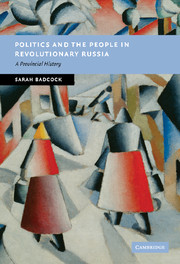Book contents
- Frontmatter
- Contents
- List of figures and table
- Notes on the text
- Acknowledgements
- Maps
- 1 Introduction
- 2 The February revolution: whose story to believe?
- 3 The Socialist Revolutionary Party and the place of party politics
- 4 Choosing local leaders
- 5 Talking to the people and shaping revolution
- 6 Soldiers and their wives
- 7 ‘Water is yours, light is yours, the land is yours, the wood is yours’
- 8 Feeding Russia
- Conclusions
- Bibliography
- Index
- NEW STUDIES IN EUROPEAN HISTORY
1 - Introduction
Published online by Cambridge University Press: 10 August 2009
- Frontmatter
- Contents
- List of figures and table
- Notes on the text
- Acknowledgements
- Maps
- 1 Introduction
- 2 The February revolution: whose story to believe?
- 3 The Socialist Revolutionary Party and the place of party politics
- 4 Choosing local leaders
- 5 Talking to the people and shaping revolution
- 6 Soldiers and their wives
- 7 ‘Water is yours, light is yours, the land is yours, the wood is yours’
- 8 Feeding Russia
- Conclusions
- Bibliography
- Index
- NEW STUDIES IN EUROPEAN HISTORY
Summary
The catastrophic failure of the Provisional Government's attempts to govern Russia and to safely usher in a democratically elected national assembly overshadows any study of 1917. The democratic party political system that was used as a basis for the new regime failed to take root, and was swept away by the Bolshevik seizure of power in October 1917. This book will look at the roots of Russian democracy's collapse after only eight brief months, by exploring the experiences of ordinary people in 1917. The evidence from Nizhegorod and Kazan suggests that localism overwhelmed national interests in 1917, and that, as Donald Raleigh put it, ‘Russia was breaking into local economic units’. This study argues that ordinary people displayed autonomy and direction in 1917, but that their motivations and short-term goals did not coincide with those of the state. For Nizhegorod and Kazan, February 1917 began the process of a complete collapse of central governmental power. The Provisional Government's faith in democratic government, and in the potential of Russia's people to govern themselves, proved to be incompatible with their other goals of maintaining domestic peace and order, and continuing Russia's involvement in the war effort.
There is a massive body of literature tackling the events of 1917, and a number of recent works have provided full and balanced accounts of the course of events. Despite the rich historiography of the Russian revolution, however, the focus of historical study has been on the capitals, and the urban, organised population.
- Type
- Chapter
- Information
- Politics and the People in Revolutionary RussiaA Provincial History, pp. 1 - 29Publisher: Cambridge University PressPrint publication year: 2007

